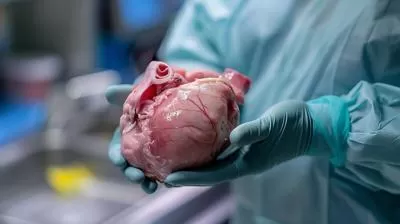The Swine Solution? How Pig Kidneys Could Redefine Transplant Medicine
Share- Nishadil
- November 06, 2025
- 0 Comments
- 3 minutes read
- 62 Views

First U.S. Trial: Pig Kidneys Tested in Humans to Combat Organ Shortage
In a truly groundbreaking move, the first U.S. clinical trial is underway, exploring the use of genetically modified pig kidneys in human patients. This audacious endeavor aims to revolutionize organ transplantation and finally tackle the critical shortage plaguing countless lives.
The relentless drumbeat of the organ transplant waiting list, a somber rhythm echoing the hopes and fears of hundreds of thousands, has long been one of medicine's most profound challenges. But what if a solution, audacious and perhaps even a touch controversial, lay not in another human donor, but in an unexpected ally? You see, a groundbreaking chapter is now unfolding in the United States, a pivotal moment that could, honestly, redefine how we think about life-saving interventions forever. We're talking about pig kidneys – genetically modified ones, to be precise – being transplanted into human patients for the very first time in a formal clinical trial.
This isn't some far-off science fiction; it's happening right now. Researchers are embarking on the inaugural U.S. trial, transplanting these specially engineered porcine kidneys into individuals who are, tragically, already brain-dead and on life support. Now, before you conjure images of immediate human recipients walking around with a pig's organ, let's be clear: this initial phase is an incredibly cautious, yet immensely critical, step. The goal here is rather simple, really, though profoundly difficult in execution: to meticulously observe how these organs behave within a human body, gathering invaluable data on everything from immune rejection to kidney function, all without jeopardizing a living patient.
It's a journey, in truth, that has been years in the making. Scientists, with their characteristic blend of relentless curiosity and sheer determination, have been working tirelessly to overcome the biological barriers that historically made xenotransplantation – the transfer of organs between different species – an almost impossible dream. These pigs, you might wonder, aren't just any pigs; they've been genetically tweaked, often with a dozen or more modifications, to reduce the chances of immediate and violent rejection by the human immune system. And this intricate dance between human biology and porcine genetics is, quite frankly, a marvel of modern bioengineering.
Why pigs, though? Well, for one, they're physiologically similar to humans in many ways, and they can be bred relatively quickly and in controlled environments. The sheer volume of need for organs – kidneys, in particular, are perpetually in short supply – makes this pursuit not just appealing, but arguably imperative. For too long, the only real hope for someone with end-stage kidney disease has been a human donor, a resource that is, by its very nature, finite and precious. And for too many, that wait proves tragically long.
Of course, such a revolutionary approach doesn't come without its complexities, its ethical quandaries, or its skeptics. There are questions, legitimate ones, about long-term safety, the potential for zoonotic disease transmission, and, naturally, the moral implications of using animals in this way. Yet, the overwhelming promise – the chance to genuinely alleviate human suffering on a scale previously unimaginable – drives this research forward, pushing the boundaries of what we once thought possible in medicine. This trial, a cautious probe into uncharted medical territory, isn't merely about transplanting an organ; it's about transplanting hope, a real, tangible hope, for a future where organ scarcity is, for once, a problem of the past. And that, you could say, is a vision truly worth pursuing.
Disclaimer: This article was generated in part using artificial intelligence and may contain errors or omissions. The content is provided for informational purposes only and does not constitute professional advice. We makes no representations or warranties regarding its accuracy, completeness, or reliability. Readers are advised to verify the information independently before relying on







